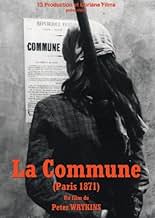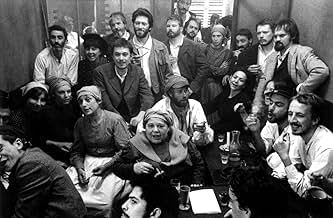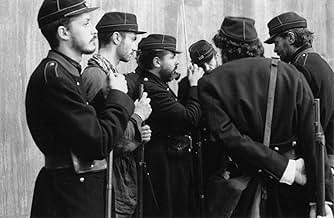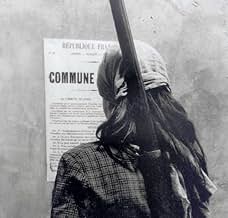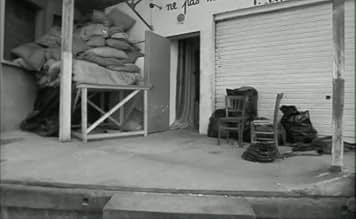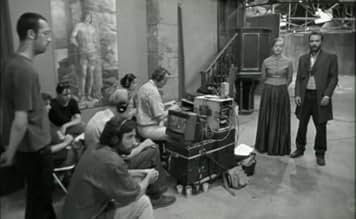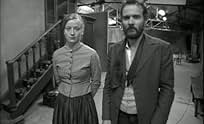AVALIAÇÃO DA IMDb
8,0/10
1,4 mil
SUA AVALIAÇÃO
Adicionar um enredo no seu idiomaIn this war drama blurring the lines between documentary and fiction, the working class and the bourgeoisie of 19th century Paris are interviewed and covered on television, before and during... Ler tudoIn this war drama blurring the lines between documentary and fiction, the working class and the bourgeoisie of 19th century Paris are interviewed and covered on television, before and during a tragic workers' class revolt.In this war drama blurring the lines between documentary and fiction, the working class and the bourgeoisie of 19th century Paris are interviewed and covered on television, before and during a tragic workers' class revolt.
- Direção
- Roteiristas
- Artistas
- Prêmios
- 1 vitória e 1 indicação no total
- Direção
- Roteiristas
- Elenco e equipe completos
- Produção, bilheteria e muito mais no IMDbPro
Avaliações em destaque
I don't think this is Peter Watkins's "best" film, exactly. It lacks the discipline and precision of "Edward Munch." But this is the purest example of the potential of Watkins's practice. Few films I've ever seen have felt as alive as a collaboration between a director and a group of performers. The non-actors, denizens of a working-class neighborhood of Paris, lived together and collaborated with Watkins as a legit, studio-based commune during their re-enactment of the events of Paris, 1871. In the film's second half, the reenactment subtly starts to occasionally give way to conversations between the performers during the course of the production. The past starts to seem truly "re-enacted," as the "present" seems to become part of a work of historical story-telling. In the final scenes, the actors seem to go into a kind of trance of fury as they sing revolutionary songs while awaiting to defend the city from Versailles' soldiers. Many turn to the camera and say that they would pick up guns to fight for a new commune in the present. As a viewer, I believed them.
This film also goes farther in its critique of media than Watkins' earlier films. All of Watkins's films feature a contemporary documentary camera crew interviewing historical figures in a way that is quite confrontationally unnatural. In the previous films, the (seemingly) Watkins-led camera crews were portrayed as the allies of "the people." Here, the larger canvas allows for a more nuanced critique of even "people's media." Two media outlets vie for the hegemony of the viewer: Versailles News and Commune TV. Even Commune TV, the "ragtag, independent" news outlet is presented as always veering towards the most relatively conservative seats of power. The Commune reporters consistently defend the (I think rather inappropriately maligned) "professional" Commune leadership from the masses. (As much as I admire Watkins, he is undeniably an ultra-leftist.) I wonder, however, if this more complex take on the media is not tied to the more complex layerings of "realities" in this work that I discussed in my first paragraph. For, unlike, in the earlier films, here the "progressive" media outlet (Commune TV) is not the "highest" reality, and therefor is not directly attached to Watkins himself. It is only part of the historical fiction that Watkins implements to show his performers embrace the political heritage of the Commune. In the scenes where the performers discuss their experiences of the production with each other, Watkins name is only ever mentioned with reverence. The filmmaker deepens his critique of media, but not of his place within it as a "radical saint."
This film also goes farther in its critique of media than Watkins' earlier films. All of Watkins's films feature a contemporary documentary camera crew interviewing historical figures in a way that is quite confrontationally unnatural. In the previous films, the (seemingly) Watkins-led camera crews were portrayed as the allies of "the people." Here, the larger canvas allows for a more nuanced critique of even "people's media." Two media outlets vie for the hegemony of the viewer: Versailles News and Commune TV. Even Commune TV, the "ragtag, independent" news outlet is presented as always veering towards the most relatively conservative seats of power. The Commune reporters consistently defend the (I think rather inappropriately maligned) "professional" Commune leadership from the masses. (As much as I admire Watkins, he is undeniably an ultra-leftist.) I wonder, however, if this more complex take on the media is not tied to the more complex layerings of "realities" in this work that I discussed in my first paragraph. For, unlike, in the earlier films, here the "progressive" media outlet (Commune TV) is not the "highest" reality, and therefor is not directly attached to Watkins himself. It is only part of the historical fiction that Watkins implements to show his performers embrace the political heritage of the Commune. In the scenes where the performers discuss their experiences of the production with each other, Watkins name is only ever mentioned with reverence. The filmmaker deepens his critique of media, but not of his place within it as a "radical saint."
Peter Watkins' nearly 6-hour long docudrama, "La Commune (Paris, 1871)," is a surprisingly passionate and fast-moving lesson in history. It is also a brilliant demonstration of how history is shaped, and re-shaped, by the tellers of the tale.
Using the "You Are There" approach of earlier radio and TV days, Watkins has a male and female news team from "Commune TV" wandering through the poorest district of Paris inviting people to express their grievances against the state to the camera.
While the people bitterly suffer because of the government's inept defeat at the hands of the Germans during the Franco-Prussian War, their anger inspires solidarity for them throughout Paris, and although they briefly rise up and seize power, they are brutally put down in the end.
Ironically, during the course of their uprising, a TV monitor in the background features happy-talk "Versailles TV" news anchors, who continually vilify the Communards and rationalize the government's brutal acts of supression.
"La Commune" is a must-see for students of history, and a must-see for students of the media.
Using the "You Are There" approach of earlier radio and TV days, Watkins has a male and female news team from "Commune TV" wandering through the poorest district of Paris inviting people to express their grievances against the state to the camera.
While the people bitterly suffer because of the government's inept defeat at the hands of the Germans during the Franco-Prussian War, their anger inspires solidarity for them throughout Paris, and although they briefly rise up and seize power, they are brutally put down in the end.
Ironically, during the course of their uprising, a TV monitor in the background features happy-talk "Versailles TV" news anchors, who continually vilify the Communards and rationalize the government's brutal acts of supression.
"La Commune" is a must-see for students of history, and a must-see for students of the media.
Once again, the National Gallery of Art film program has brought us another film we are unlikely to see at any other theater. This is an uneven but ultimately fascinating look at a relatively unknown period in French history, the 1871 Communard revolution in Paris right after the Franco-Prussian War. The filmmaker uses non-professional actors who were also allowed to be co-producers and to write their own lines to some extent. It is shot in black and white and on Beta Digital tape. The film technique reminds me of an old TV program from the 1950s' called "You Are There" in which today's media looks back on history and even interviews the participants in the historical drama.
The film is very slow going which gives the viewer a total feeling of both being there right in the action on a day to day basis while looking down on it from afar. We live the everyday life of the people in Paris during this short period of 2 1/2 months. At some points, the actors stop the action and comment on their involvement in the making of the very film they are in. Also, they and the filmmaker comment on globalization and peoples' rights in today's world. History is brought forth into our present time and we see that all events in human history are more alike than they are different.
This film is not for the average movie-goer. It is for a small audience of patient students of history and politics. It fascinated me but also tried that patience quite often. I would recommend not attempting to view this film without being well rested. It is in two parts of three hours each. Frankly, the filmmaker could have cut this down and still had a powerful history lesson for all of us.
The film is very slow going which gives the viewer a total feeling of both being there right in the action on a day to day basis while looking down on it from afar. We live the everyday life of the people in Paris during this short period of 2 1/2 months. At some points, the actors stop the action and comment on their involvement in the making of the very film they are in. Also, they and the filmmaker comment on globalization and peoples' rights in today's world. History is brought forth into our present time and we see that all events in human history are more alike than they are different.
This film is not for the average movie-goer. It is for a small audience of patient students of history and politics. It fascinated me but also tried that patience quite often. I would recommend not attempting to view this film without being well rested. It is in two parts of three hours each. Frankly, the filmmaker could have cut this down and still had a powerful history lesson for all of us.
Truly exceptional film making really breaking down the barriers of what is storytelling and letting everything run free. Peter Watkins does what would seem the impossible, not only create a realistic re-enactment of the commune in Paris (just after the siege of the Prussians and the exile of the bourgeois to Versailles) using only an abandoned warehouse and 200 odd unemployed French citizens and illegal immigrants but also to on top of that add a detailed and amazing social experiment. Putting these people through this experience and then have them portray not only their 1871 characters but also themselves in the one film. To hear these people talk about life today and draw parallels between the film they are making and the lives they lead is quite invaluable information. And as if that alone wasn't enough there is the whole other element of the media and how sides are formed and why people believe what they do and how things are taught and passed down so that divides never seem to cease. The use of reporting and television and newspapers really give this film a whole other level from which to operate and constantly throughout the film one has to ask themselves "who do I believe, do I believe anyone" "why am i believing what this person says and not this person" then as if one hasn't had enough thinking to do already you then, like the cast, have to project forward to today and ask yourself who do i believe when it comes to the reporting of current events? Am I receiving an accurate picture of what is occurring? I don't think anyone who offers themselves up to this 6 hour masterpiece can look at the media in quite the same way. Once again I just have to say this film is without a doubt set to become a masterpiece to filmmaking and I urge anyone who happens to see it on a program for a festival or perhaps even on television to sacrifice those few hours, you wont be disappointed. Also is you are left in awe after its viewing as I was then look out for the Universal Clock- The Resistance of Peter Watkins, it acts as a sort of "making of" but is a film in its own right and gives insight to what it was like to be involved in the making of Le Commune Paris 1871
Peter Watkins' nearly 6-hour long docudrama, "La Commune (Paris, 1871), is a surprisingly passionate and fast-moving lesson in history. It is also a brilliant demonstration of how history is shaped, and re-shaped, by the tellers of the tale.
Using the "You Are There" approach of earlier radio and TV days, Watkins has a male and female news team from "Commune TV" wandering through the poorest district of Paris inviting people to express their grievances against the state to the camera.
While the people bitterly suffer because of the government's inept defeat at the hands of the Germans during the Franco-Prussian War, their anger inspires solidarity for them throughout Paris, and although they briefly rise up and seize power, they are brutally put down in the end.
Ironically, during the course of their uprising, a TV monitor in the background features happy-talk "Versailles TV" news anchors, who continually vilify the Communards and rationalize the government's brutal acts of suppression.
"La Commune (Paris, 1871)" is a must-see for students of history, and a must-see for students of the media.
Using the "You Are There" approach of earlier radio and TV days, Watkins has a male and female news team from "Commune TV" wandering through the poorest district of Paris inviting people to express their grievances against the state to the camera.
While the people bitterly suffer because of the government's inept defeat at the hands of the Germans during the Franco-Prussian War, their anger inspires solidarity for them throughout Paris, and although they briefly rise up and seize power, they are brutally put down in the end.
Ironically, during the course of their uprising, a TV monitor in the background features happy-talk "Versailles TV" news anchors, who continually vilify the Communards and rationalize the government's brutal acts of suppression.
"La Commune (Paris, 1871)" is a must-see for students of history, and a must-see for students of the media.
Você sabia?
- Versões alternativasIn December 2002 Peter Watkins started the editing of an abridged theatrical version. In a prologue he expresses his views on discovering that the production company, 13 Production, has financial links with the Lagardère Group (which sells Military Weapons through Matra), then he warns the audience about how much of the sequence shots and live debates from the original full-length movie have been lost in the process of reducing the running time by more than 2 hours to 3 hrs 1/2.
- ConexõesFeatured in The Universal Clock: The Resistance of Peter Watkins (2001)
Principais escolhas
Faça login para avaliar e ver a lista de recomendações personalizadas
- How long is La Commune (Paris, 1871)?Fornecido pela Alexa
Detalhes
Bilheteria
- Faturamento bruto nos EUA e Canadá
- US$ 5.340
- Fim de semana de estreia nos EUA e Canadá
- US$ 2.930
- 6 de jul. de 2003
- Faturamento bruto mundial
- US$ 21.641
- Tempo de duração5 horas 45 minutos
- Cor
- Mixagem de som
- Proporção
- 1.66 : 1
Contribua para esta página
Sugerir uma alteração ou adicionar conteúdo ausente

Principal brecha
By what name was Comuna de Paris, 1871 (2000) officially released in Canada in English?
Responda
